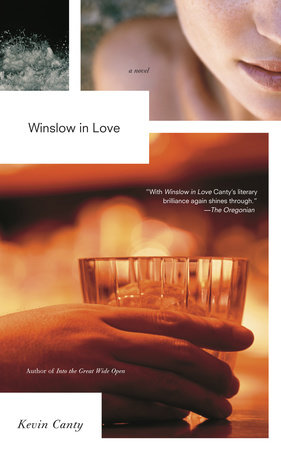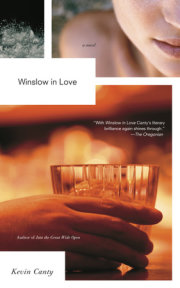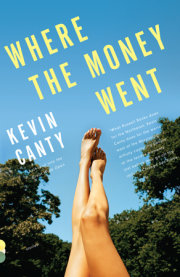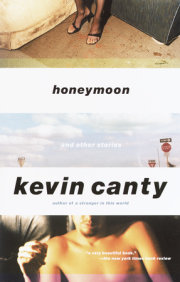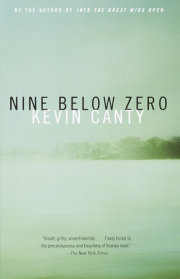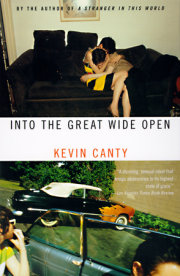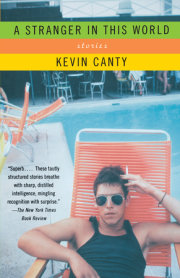The rain fell on downtown Portland, not in any kind of unusual way. It was four-thirty on a December afternoon and Winslow, drunk, sat by the front window of Kelly's Olympian and watched the passersby. The afternoon was fading fast and the faces were darkening outside, unfurling their umbrellas against the rain, hurrying toward their buses and cars and taxicabs and appointments, everybody rushing toward their own deaths, Winslow thought, and none of them knew it.
He had a pack of Tareytons and a pitcher of draft beer and the daily papers, the
Oregonian and the
New York Times both. He read the local paper carefully from back to front, from sports to news, and then went back through the
Times to see what he had missed. When an item struck his imagination he would sometimes write a sentence or two down in his notebook. He kept the notebook in his overcoat pocket, as he was not the type to write ostentatiously in bars or coffee shops. Just then he felt an image coming up to the surface, something about the faces outside the window, like a whole school of fish turning at once, the silvery bodies in three dimensions, something about the way they didn't recognize themselves as beautiful but just kept on schooling to their separate ends. Then remembered that Pound had gotten there first:
petals on a wet, black bough . . . It was not fair that so many of his best ideas were someone else's.
The bar was long and dim with neon lights high up against an old tin ceiling. A kitchen at the far back contributed the smell of stale fryer oil to the general funk of spilled beer, cigarette smoke and Lysol. Toothlessness and vomit; he watched a pair of old girls going at it, shoving each other against the bar, cursing. One of them he recognized as the folding-chair woman, a tiny short angry woman who had been beating the day bartender with a metal folding chair the first day he had found Kelly's. The bartender was at least eighteen inches taller than she was and had an earring and his head shaved like Mr. Clean. He stood impassively with his arms folded in front of him while she beat against him with the folding chair until she wore herself out, and then he 86'd her. She had been 86'd by every bartender so far, but the turnover was high on the day shift and so she was back.
Later, when the light outside died completely, Winslow would move back to sit at the bar, where generations of drinkers had worn grooves into the top by rubbing quarters back and forth on the wood, the knurled metal edges digging deep smooth trenches into the bar, and nobody minded.
In the last months, he had seen youth in the bar, the black t-shirt and black leather crowd, and soon it would be over and the last downtown bar would be gone and Portland would have finished turning into something else and it would be time to move on. Not yet.
So much money in town now, he thought. So much success. A little failure kept him honest.
Winslow stubbed his cigarette out and laid the butt in the ashtray in a parallel line with the rest of the afternoon's dead soldiers. They were each smoked down to half an inch from the filter, each the same length, each lined up neatly with the others. The rain was coming down a little harder now, the pedestrians all walking faster or sleek under dark umbrellas and dark overcoats but still hurrying before their shoes got wet, all hurrying toward drinks or dates or a last appointment, all holding the city in the air between them, Winslow thought, a city made not from bricks and concrete and asphalt but by the intentions and desires of the souls who lived in it. Everybody wanted something. Everybody wanted the same thing, lately: money, success, a mistake-free life, a life without enemies. All these intersecting desires, colluding, colliding, all this assorted valence, with some of them missing an electron in the outer shell and some of them with an extra electron . . . Wisdom from the Army: he remembered Solomon Jackson, the look in his red, diseased eyes when he said: You want to live without enemies. You're afraid to make enemies.
Later on they became friends. After that, Solomon died. Winslow slumped back against the well-worn wooden bench, his hands splayed out in front of him, like a priest's hands, open and fat. The light was delicate and gray. Winslow himself was fat and bald and drunk but at least he was clean, he was scrupulous about that. He wore a white shirt and a tweed sport jacket. He sat back waiting for whatever the afternoon would bring him, and after that the evening.
He was watching the sky when June Leaf came in. He didn't see her until she sat down across from him and poured her own clean glass full from what was left of Winslow's beer.
"You fucker," she said. "I thought you were working."
"I was," he said.
He pushed the pack of cigarettes over to her but she shook her head. June Leaf smoked three a day but this wasn't the time.
"What happened?" she said.
"I came to a spot," he said. "It just seemed like a moment to take a break."
"How long have you been here?"
He held the pitcher at an angle so the beer ran down into a corner of it. "Just this," he said.
"Don't you lie to me."
Winslow looked at her: something in her voice, some new aggravation. It was a small lie, one pitcher short of the truth, and, besides, June Leaf was not an innocent herself. She drank the first glass of beer in a hurry and then poured herself another out of the rest of Winslow's beer, leaving him half a glass away from dry. Then she shook the cigarette out of the pack and looked around to see who she knew. Eddie in the plastic pants waved back at her. She regarded Winslow through the haze of her smoke.
"Did you get anything done today?" she asked.
"Enough," he said. "I paid my debt to society."
She knew he was not telling the truth—Winslow could feel it, the way her eyes glanced off his face—but she didn't take him up on it. This was marriage in Winslow's experience: knowing the other well enough to know she was lying but not well enough to know why. June Leaf settled into the opposite chair, a tall thin angular woman all in black, half a head taller than Winslow, people stared when they went out. She craned around to watch the dim afternoon outside.
"Nice light," she said. "Filthy weather, though. You got a call this afternoon."
Winslow waited for the rest of it, watching her hands in the soft enveloping light, as she was watching her hands herself. She stubbed out her cigarette haphazardly in the ashtray, ruining his careful alcoholic symmetry. June Leaf was a painter, though lately she had been supporting both of them as a claims adjuster for Kaiser. Winslow was fifty-five and she was forty-one and they had been married three years. They met in Mexico.
"Who did I get a call from?" he finally asked.
"It was Jack Walrath, over in Athens?" June Leaf said. Winslow felt his heart race inside him, this new call to glory, a voyage to Greece; and June Leaf must have seen it on his face as she quickly added, "Not
that Athens. The one in Montana."
Winslow remembered Walrath then, a fool, a fixer, a second-rate poet. "What did he want?"
She said, "Apparently a visiting writer canceled out on them and now they want you."
"For what?"
"A semester, is what he said. Twenty-five thousand dollars and an apartment, is what he said."
"Oh, shit," Winslow said.
He looked at her face in the fine soft light of the window, long and lined, dark eyes, dark lips, the beautiful hollow at the base of her throat. She looked tired, he thought.
"What's wrong?" she said. "I thought you'd be happy about it."
Winslow hadn't written anything worth reading for eighteen months. He knew that for a fact, knew that as well as he knew his own name, and the thought of trying to tell anyone anything about poetry made him ill. The idea of standing up in a classroom again, which he had done before, and pretending that he knew anything about it. He should have told her before, should have confirmed what June Leaf suspected: that he spent his working hours in idleness and masturbation. The enterprise of poetry had defeated him entirely.
He should have told her but he had not, and now it was too late. June Leaf had been supporting both of them, with small exceptions. It came down to the money.
June Leaf looked at him warily. "I thought you'd be happy about it," she said again.
"No, it's good," he said. "It's a good thing."
She knew him well enough to disbelieve him.
"Well, I'm celebrating," she said, taking the empty beer pitcher from the table. "I'm drinking gin myself. Do you want anything? Or are you going to keep on drinking beer?"
"Scotch on the rocks," he said automatically, watching her skinny ass recede into the gathering crowd around the bar. It would take her a few minutes to get the bartender's attention, which was good. Winslow would try to compose himself, try to be happy, as she believed he should be. To feel the proper emotions. What one ought to feel.
She had told him before—she was feeling it now—that she felt invisible sometimes, that Winslow was the only living being in Winslow's world, that everybody else including her was just furniture. He didn't know that she was wrong. He hoped she was wrong but he didn't know. Did he love her? Winslow didn't know. He felt some deep stirring inside him but whether it was what other people called love or not was a mystery.
But solvent, Winslow thought. Money in the bank, money in his pocket. Back to being the overdog. He knew it wasn't good for him but still.
Somewhere outside, past the edge of the city and even in the city itself, in the dark dripping passages between buildings and the blackberry brambles along the edges of the railroad cuts, water was dripping over dark leaves, animals were moving through the undergrowth, the steelhead were making their way upstream from the Pacific.
Anadromous, he thought. Oregon out there in the rain.
"What's the matter with you?" June Leaf said. She set the bar glass down on the table in front of him and Winslow saw that it was a double: happy hour.
"The long illness of my life," he said, and both of them laughed and drank. "When does all this start?" he asked. "When does he want me over there?"
"The semester starts the end of January."
"Dear God," said Winslow. "We're moving to the North Pole."
"
You're moving," June Leaf said.
Later: fat man in the bathtub. This was where he did his thinking, after a fashion, whatever you called it when the brain was trying to surface through a sheen of alcohol. June Leaf was at her studio painting, or whatever she did when she was there, she erased—it seemed like—more than she ever painted. And everything was fine with her after the evening. There were cocktails, which made everything fine.
Winslow floated. There was enough of him to make it perilous to move, there was sloshing and splashing and water spilled on the tile floor of June Leaf's apartment. Though he lived there now, too, though they were as married as they were ever going to get, it was still and would be forever June Leaf's apartment. Until the landlord got them out. Floor by floor, apartment by apartment, the old tenants were leaving and the landlord was remodeling in their wake. The flat below, where Mrs. Esterhazy had said her last words in Hungarian—said them to Winslow, who had found her with a broken hip on the stairs and carried her inside—was now the nest of a pair of cuckoobirds with square granny glasses and the girl had pink hair. Everything was broken.
Winslow watched his dick float limp in the water, his gray seaweed.
Winslow tried to think of what he could tell the children of Athens about poetry. He had not started out feeling like a Latin teacher but by now he did, the lame protest that poetry was good for you, that poetry built intellect and character, that captains of industry and powerful men had all grown up on poetry, stupid enough even if it was not a lie, which it was. The captains of industry had grown up on touch football and beer. They liked red meat and heterosexual sex. Even Mrs. Esterhazy, who could have used a little, had lived and died entirely without poetry. The men at the paper mill where his father had worked, the television-loving millions, they were better off without it. Selling little ego pills:
You can make this work, little Susie, little Ned.
You can make this somehow matter, though the rest of us have failed.
He would teach them Rilke. They would like Rilke—the sponger, the rich woman's amusement with his angels and vapors. It would serve them right. They would leave him alone. If they didn't like it, he would make them all read Gertrude Stein and then pretend to understand it. What do you mean, little Susie, little Ned, that you don't
get it? Why are you so worried about
getting it?
Something about the prospect of teaching brought out the sadist in him. But Winslow felt better now. He had a game plan. He nudged the hot-water tap open with his foot and felt the healing waters spill over him, took a sip from the icy glass of scotch on the edge of the tub and settled back again, listening to Ellington in the next room. The bathroom ceiling was almost ten feet high so the heights of the room almost disappeared in the steam, a yellowing waterspotted dimness in the incandescent light, a color out of favor now. Everything was white or blue-white now, all cool and clean. No more octagonal tile, no more wainscoting, no more faintly dirty butter-colored light.
We are the bees of the invisible, Rilke said. At times Winslow could almost make sense of it. He lit a cigarette and lay back in the water.
Copyright © 2005 by Kevin Canty. All rights reserved. No part of this excerpt may be reproduced or reprinted without permission in writing from the publisher.

